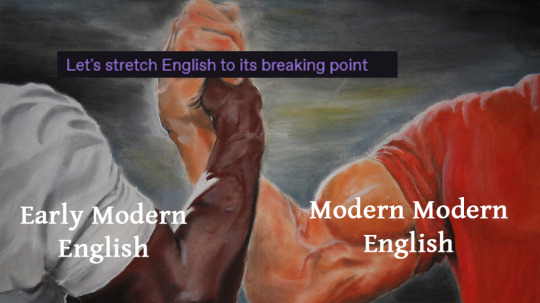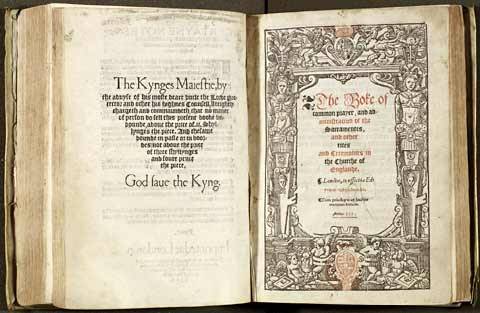#Early modern English
Text
The f of enough
The word enough has the same origin as German genug and Dutch genoeg. However, unlike these words, enough doesn't start with a g-. Moreover, contrary to what its spelling suggests, it ends with an /f/ sound. When did these changes happen? Click the video to listen to a reconstruction of how this word evolved over the past 2300 years.
Enow
Modern English enough comes from the Old English variant ġenōh, with an unvoiced /x/ at the end. The variant ġenōg, with the voiced fricative /ɣ/, also continued to evolve but it followed a different path. Its final /ɣ/became /w/ in Middle English, producing inow. This was a regular sound change. Compare Old English būgan, which became bowen, now to bow. Dutch buigen and German biegen preserved their g's.
Inow ultimately became Modern English enow, which rhymes with how. It's become archaic, but when it was a living part of English, it was often used before plural nouns: enow people.
Notes
In Middle and Early Modern English, different dialects underwent different sound changes, and some sociolects were more conservative than others, preserving certain stages for a longer time. Variants shown and not shown in my chronology coexisted. This chronology, which represents the evolution in the London region, is only one of the paths this word took.
I thank fellow historical linguist Alex Foreman (A.Z. Foreman on X, YouTube and Patreon) for his advice on reconstructing the changes in the Late Middle English period.
#historical linguistics#linguistics#language#etymology#english#old english#middle english#early modern english#video#audio#lingblr#proto-germanic#proto-west germanic
47 notes
·
View notes
Text
THOU, THEE, THY, THINE. SAME THING RIGHT?
NO.
Although they seem very similar, Shakespeare would be in tears if he saw how most people mix them up. lets save William the misery and teach you when to correctly use thou, thy, and thine.
THOU
Thou = You (in subject form)
"Thou art killing me."
"Art Thou crying?"
THEE
Thee = You (in object form)
"I want to kill thee."
"My dog ate thee in my dream."
THY
Thy = Your (before a word that starts with a consonant)
"Thy mother."
"Give me thy duck."
Thyself is used the same as any other thy+word combination like "thy mother" but without a space
"Take care of thyself."
THINE
Thine = Your (before a word that starts with a vowel)
"Thou art on thine own."
"Thine answer hath satisfied mine query."
OR
Thine = Yours
“This is thine.”
“The throne is thine, should thou choose to take it.”
(last 2 examples by @bookishwenchmeltha)
Now Shakespeare can truly rest in peace.

Go follow me @leisureflame for more posts like this!
#writing#shakespeare#language#old english#history#writing tips#writing recources#early modern english#thy#thine#thou#thee
821 notes
·
View notes
Text

I got to channel Urianger FFXIV to roast someone
103 notes
·
View notes
Text

Tale as old as time.
inspo: @permanenthistorydamage
#linguistics#English#modern english#early modern english#linguistics memes#English memes#language memes#languageblr
22 notes
·
View notes
Text
ok here's something i've been baffled about for a while that seems like it fits best on this blog: why are there so many big-budget pieces of fiction that completely fail to use grammatically correct early modern english? i don't blame individual authors for not knowing how to conjugate verbs after "thou" and where to put "thy/thine" or whatever, but you'd think that, say, a video game that presumably has a ton of people working on it could get someone to check over the script and make sure there are no glaring errors. and yeah, that would cost money, but it's shocking that so many people don't realize that "old timey language" is something you can do wrong and that there are people who will notice if it's done wrong. like it just feels like sloppy writing!
#my post#early modern english#i am vagueing at dark souls primarily but there are a couple other games + comics i've noticed this in recently
13 notes
·
View notes
Text
"[L]ove is not love / which alters when it alteration finds, / Or bends with the remover to remove."
Read it here | Reblog for a larger sample size!
Shakespeare resource where you can search all of his works for a specific word of phrase
#closed polls#polls#poetry#poems#poetry polls#poets and writing#tumblr poetry#have you read this#sonnet 116#william shakespeare#early modern english#early modern period#admin faves
9 notes
·
View notes
Text
When Shakespeare wrote in Early Modern English, the suffix -ture was not pronounced with a modern “ch” sound. Instead, it was pronounced as a flat “ter.”
I am, therefore, delighted to inform you that Shakespeare would have called small furry animals “critters.”
#Shakespeare sounds 100x better in an American southern accent example no. 147#Shakespeare#early modern English#okay technically he would have said kree-ter but close enough#willy shakes
138 notes
·
View notes
Note
Hello can you tell me what "Hail yourself" or "hail thyself" mean? I mean it sounds pretty simple but my brain refuses to understand it haha
Mostly it comes out of LaVeyan Satanism's focus on individual and "worship" of the self. Like, one's own birthday is the highest holiday in LaVeyan Satanism. That sort of thing.
There are lots of problems with Anton LaVey's philosophy at a fundamental level, but as a corrective to people who have been told under Christianity that they are sinful, despicable worthless creatures and all praise and glory for any good thing should be given to God, it has a lot of utility.
Some Christian sees a good thing happen and says, "Praise God!" But a Satanist says, "Hail yourself."
Now, the "hail thyself" is a little faux-King James-style English which is often deployed to sound more olde timey rather than follow the grammatical rules of the time, or its actual usage by those biblical translators to try to maintain singular/plural second-person plural (shoulda gone with you / y'all, really).
The worst of these faux-religious formulations may be "Thyself is thy master", which definitely seems like you could just say, "You are your (own) master" or "Thou art thy (thine own) master".
Look, Satanism is cringe. You just have to lean into it and have fun with it.
57 notes
·
View notes
Photo

Ladies... are your tits milky apples? Do they wave like seas when winds most calm doth blow?
Image ID below. I have slightly edited the text for clarity, which was written in Early Modern English, and might not be compatible with screen readers.
[Image ID: Book 7, Verse 14 of Orlando Furioso by Lodovico Ariosto, translated by Sir John Harrington.
Her breast as milk, her neck as white as snow,
Her neck was round, most plum and large her breast
Two Ivory apples seemed there to grow,
Full tender smooth, and fittest to be pressed:
They wave like seas, when winds most calm doth blow,
But Arg*s self might not discern the rest,
*Yet by presumption well it might be guessed,
That that which was concealed was the best. /.End ID]
#this is from the 1591 english translation of the italian epic Orlando Furioso which was originally published in 1516#the specific story this passage belongs to was adapted into two operas#one of which i had the pleasure of seeing recently#and im obsessed#so#Alcina (Handel)#Alcina (Caccini)#also#other stories from this epic were used by Shakespeare as sources for some of his plays#including much ado about nothing#this was a very influential text#he speaks#early modern english#she breasted boobily
7 notes
·
View notes
Text
Lady: 'bread kneader'
Lady stems from a compound meaning 'bread kneader'. It consisted of Proto-West Germanic *hlaeb (bread), the ancestor of loaf, and *daigijā (kneader), a derivation of *daig, the ancestor of dough. In Old English, the compound had become hlǣfdiġe, meaning 'mistress of the household'. Click the video to hear how it changed in 2500 years.
#historical linguistics#linguistics#language#etymology#english#old english#middle english#early modern english#proto-germanic#proto-west germanic#lingblr#video#audio
256 notes
·
View notes
Text


Carlisle's Book of Common Prayer, 1549
The first Book of Common Prayer was written for standardized liturgical use in the Anglican church in 1549. This copy first belonged to Carlisle's grandfather and was passed down to his father. This was the only keepsake Carlisle managed to save from his human life. (Thankfully, Alistair found the cross many years later, so now he has two keepsakes.)
Carlisle used this book to officiate Rosalie and Emmett's (first) wedding in 1935 and also Alice and Jasper's wedding in 1950.
More headcanons here.
#Tale of Years photo album#Carlisle#Books#Anglican church#Historical Context#Early modern English#Thomas Cranmer#Not sure if this is really an original edition but it's my two favorite pictures of it
14 notes
·
View notes
Text
The first gentle movements, when they came, were testament to the fact that a new life had begun. For as far as Tudors were concerned, life did not begin at conception…Life itself was deemed to begin when the soul entered the fully formed foetus, which occurred at 46 days for a boy and 90 days for a girl.
—Elizabeth Norton, The Hidden Lives of Tudor Women: A Social History, p. 1
#elizabeth norton#the hidden lives of tudor women#quote#medieval history#renaissance england#pregnancy#abortion#tudor dynasty#early modern english
14 notes
·
View notes
Text
You know, I’ve always felt awkward using “y’all” when addressing a group. But in English, other options are “you guys”, “you lot”, and “youse” if not “y’all”- except for “ye”, used in Irish English and Newfoundland English.
You see, in English used to have multiple words for these things.
þū addressed one person, ġit addressed two people, and ġē addressed more than two
þū became thou, ġē became ye. Thou used to be the informal you, the formal you being “you”. The informal was done away with.
The Irish English and Newfoundland English use yeer for your, yeers for yours, Yeet selves for yourselves in this way. Something that bothers me about “y’all” is when I’m saying something like “y’all’s game” or “y’allselves”. I propose we bring “ye” back into common usage.
2 notes
·
View notes
Text
JOHN FLORIO, VENETIAN AMBASSADORS, AND THE JACOBEAN COURT ENTERTAINMENTS
With the accession of James I, John Florio's life at court began a new chapter: he held a prestigious position at the centre of power as Italian reader and private secretary to the Queen. Moreover, from 1604 to Anne's death in 1619 Florio was also in close contact with many Italian secretaries and ambassadors, as the dispatches of those years testify.
Through John Florio, these figures would have sought an audience with Queen Anne at one of her palaces, or would have attended a banquet, an official ceremony, court masque, or semi-public meal that she either held, or was present.
In this context, Queen Anne was an important patron of the Jacobean theatre through her participation in, and popularisation of, the court masque, and John Florio a central figure having an instrumental role both with the ambassadors and the arrangement of the court entertainments.
Foreign ambassadors saw these invitations to the Queen’s masques as special marks of favour shown to them by the monarchy.
This new way of arranging sumptuously court entertainments, primarily connected with political relationships, were introduced by Queen Anne, and had John Florio, her first and most important confidant, as the go-between who played a central role with both parties.
In a letter dated December 24 1608 that the venetian ambassador Marco Antonio Correr sent to Florio, it is attested that the Anglo-Italian personally invited him to a special event, possibly a court masque, performed during the Christmas holiday. The ambassador happily replied to be honoured to have received such an invitation, that would have given him "the opportunity to spend the Christmas holidays happily".
To read the letter and the full transcription: https://www.resolutejohnflorio.com/john-florio-venetian-ambassadors/
#english literature#early modern europe#early modern period#english#early modern english#shakespeare#william shakespeare#john florio#queen anne of denmark#James I#court masque#masques#ben jonson#literature
2 notes
·
View notes
Text
red
each wand'ring doll feel not in sight
but see the witch's sanguine thread
it fain to grow a heart for flight
and find the spindle in her bed
1 note
·
View note
Text
Herein doth grace
sanctify a mortal dream -
this perilous melancholy to make light.
And thus
shall my ghost yield me
to love and mercy vouchsafed.
0 notes